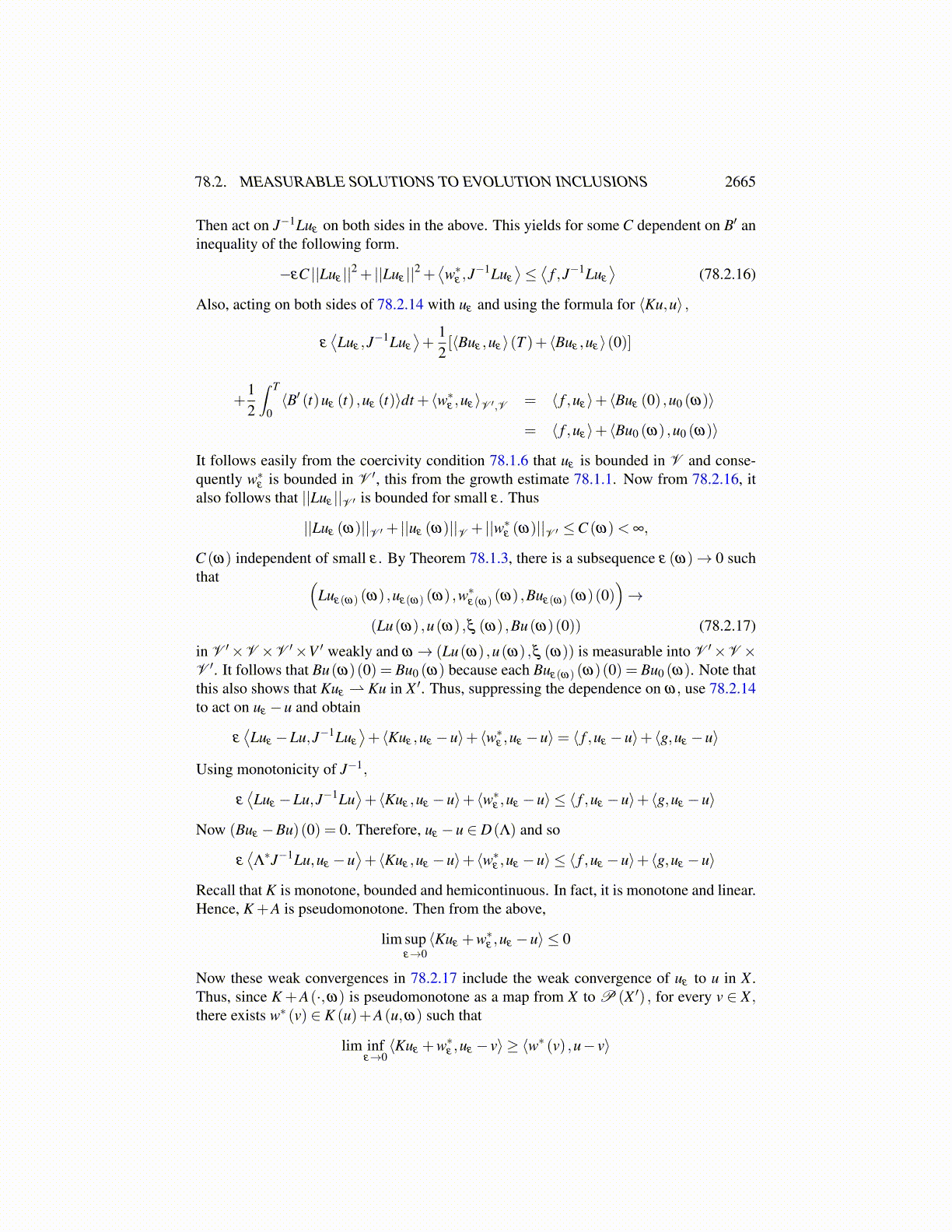
78.2. MEASURABLE SOLUTIONS TO EVOLUTION INCLUSIONS 2665
Note that from Proposition 78.1.8, if v ∈ X and Bv(0) = 0, then
⟨Ku,v⟩=∫ T
0⟨Lu,v⟩ds (78.2.13)
This is because, from the Cauchy Schwarz inequality and continuity of ⟨Bu,u⟩(·) ,
⟨Bu,v⟩(0)≤ ⟨Bu,u⟩1/2 (0)⟨Bv,v⟩1/2 (0)
and if Bv(0) = 0, then from Corollary 78.1.9, ⟨Bv,v⟩1/2 (0) = 0. From the above Proposi-tion 78.1.8, this operator K is hemicontinuous and bounded and monotone as a map fromX to X ′. Thus K +A(·,ω) is a set valued pseudomonotone map for which we can applyTheorem 78.1.12 and obtain existence theorems for measurable solutions to variational in-equalities right away, but we want to obtain solutions to an evolution equation in whichK (ω) = V and the above theorem does not apply because the sum of these two opera-tors is not coercive. Therefore, we consider another operator which, when added, willresult in coercivity. Let J : V → V ′ be the duality map for 2. Thus ||Ju||V ′ = ||u||V and⟨Ju,u⟩= ||u||2V . Then J−1 : V ′→ V also satisfies
⟨f ,J−1 f
⟩= || f ||2V ′ .
The main result in this section is based on methods due to Brezis [22] and Lions [91]adapted to the case considered here where the operator is set valued, and we considermeasurability. We define the operator M : X → X ′ by
⟨Mu,v⟩ ≡⟨Lv,J−1Lu
⟩V ′,V where as above, Lu = (Bu)′ .
Then let f be measurable into V ′. Thus, in particular, f (ω) ∈ V ′ for each ω . Consider theapproximate problem and a solution uε to
εMuε (ω)+Kuε (ω)+w∗ε (ω) = f (ω)+g(ω) , w∗ε (ω) ∈ A(uε (ω) ,ω) . (78.2.14)
Where g(ω) ∈ X ′ is given by
⟨g(ω) ,v⟩ ≡ ⟨Bv(0) ,u0 (ω)⟩
where u0 (ω) is a given function measurable into W . Now for u ∈ X , we let
A (u,ω) = εMu+Ku+A(u,ω)
Then by the assumptions on A(·,ω) , there is u∗ (ω) for which ω → u∗ (ω) is measurableinto V ′, hence measurable into X ′. Therefore, ω → A (u,ω) has a measurable selection,namely εMu+Ku+u∗ (ω) and so condition 78.1.2 is verified.
By Theorem 78.1.12, a solution to 78.2.14 will exist with both uε and w∗ε measurable ifwe can argue that the sum of the operators εM +K +A(·,ω) is coercive, since this is thesum of pseudomonotone operators. From 78.1.1
inf(∫ T
0⟨u∗,u⟩ds : u∗ ∈ A(u,ω)
)+
12
∫ T
0
⟨B′u,u
⟩≥ δ (ω)
∫ T
0∥u∥p
V ds−m(ω)
and so routine considerations show that εM +K +A(·,ω) does indeed satisfy a suitablecoercivity estimate for each positive ε . Thus we have the following existence theorem forapproximate solutions.